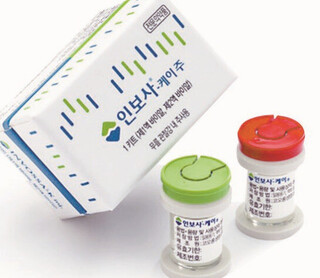 material photo” alt=”
material photo” alt=”<한겨레> Base photo
Kolon Life Sciences executives who were handed over to trial for concealing or deceived some of the experimental results to obtain permission for’Invossa Kayju (Invossa)’, a gene therapy for osteoarthritis of the knee, were convicted of bribery at the first trial. The court judged that all other charges were not guilty, saying that the Ministry of Food and Drug Safety, which decided whether to grant permission or not, did not conduct sufficient examination. On the 19th, criminal division 25-3 of the Seoul Central District Court (presiding judge Kwon Seong-su) sentenced director Jo Amugae to a fine of 5 million won on charges of interfering with hierarchical public affairs. Amugae Kim, who was charged with him, was acquitted. A former KFDA employee, Kim Amugae, who was separately accused of bribery, was sentenced to two years probation in June, and ordered a fine of 4 million won and an additional fine of 1.75 million won. Invossa, the first gene treatment for knee osteoarthritis in Korea, was approved by the Ministry of Food and Drug Safety in July 2017. However, when it was revealed that liquid 2, one of the main ingredients of the treatment, was not cartilage cells, but kidney cells that could induce tumors, the Ministry of Food and Drug Safety canceled the product license in March 2019. At the time, Director Cho and others were charged with deleting the experimental results or submitting false information to the Food and Drug Administration in order to obtain permission for manufacturing and sales of Invossa. Also, from December 2015 to May 2018, he was charged with receiving 8.2 billion won in R&D expenses for a total of 11 times by tricking the evaluation members of the Korea Research Foundation and the Korea Health Industry Promotion Association. In addition, there is a charge of providing entertainment worth 1.75 million won seven times to Kim, who was working on Invossa in the drug product license review department of the Ministry of Food and Drug Safety in order to receive convenience in the process of obtaining the product license from Invossa. The judiciary said, “It is recognized that Director Cho, etc., inevitably, is willing to interfere with the execution of public affairs.” If permission is granted without confirming the facts, it is due to insufficient examination by the administrative office and does not constitute a hierarchy of criminal law.” He pointed out, “It is a legal evaluation that if the Ministry of Food and Drug Safety licensed the treatment for genetic tea, it was necessary to check it more thoroughly in consideration of public safety.” Only for the allegations that Director Cho gave a bribe to Mr. Kim, “they provided entertainment to receive convenience informally during the development of the Invossa. Regardless of the guilt, he was sentenced to a fine.” On the other hand, the court’s ruling on the day is expected to affect the trial of the case of former Kolon Group Chairman Lee Woo-Seok and Kolon Life Science CEO Lee Woo-seok, who were handed over to trial due to the Invossa incident. By Jo Yoon-young, staff reporter
